
Raccoons are known for being highly mischievous and their nightly scavenging habits. As omnivores, they will eat almost anything they can get their paws on. You may be wondering: do raccoons kill chickens? Saldy the answer is yes; raccoons will prey on chickens and their eggs without hesitation.
Raccoons will take advantage of any opportunity that presents itself to get their prey. They are known to be skilled climbers and can easily climb over fences and into chicken coops. Once inside, they will kill and eat chickens and their eggs. This can be a major problem for chicken owners, especially those who live in areas where raccoons are prevalent.
Chicken owners should take precautions to protect their chickens from raccoons. Once raccoon tracks are found, the chicken coop must be secured with sturdy fencing and locks, and any potential food sources that may attract raccoons must be removed. By taking these steps, chicken owners can help prevent raccoons from preying on their chickens and keep their flock safe.
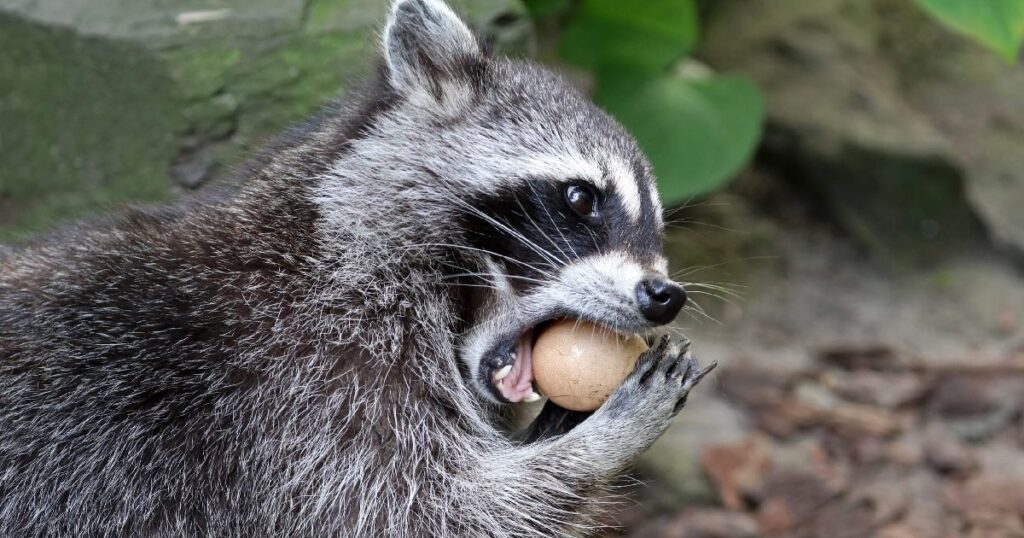
Raccoons are known to be omnivorous, meaning they eat both plant and animal matter. Their diet differs based on the season and how much food they can find. In the wild, they eat insects, fruits, nuts, and small animals like rodents, rabbits, and birds. Raccoons are opportunistic feeders and will eat almost anything they can find.
Raccoons are primarily nocturnal animals, which means they are active at night. They have the best night vision nature can offer and are well-adapted to foray into the dark. Raccoons are very curious and intelligent animals, which can lead them to explore new areas and try new foods.
While raccoons do not typically hunt chickens, they may opportunistically feed on them if given the chance. Chicken owners should secure their coops and take precautions to prevent raccoons from accessing their chickens. This can include using sturdy fencing, locking coop doors at night, and removing any potential food sources that may attract raccoons.
This can include using sturdy fencing, locking coop doors at night, and removing any potential food sources that may attract raccoons. Whatever method you choose human hand must be involved. A chicken run will scare even raccoons, but it will likely scare farmers the most.
In summary, while raccoons have a varied diet and may occasionally eat chickens, they are not a primary predator of chickens. Chicken owners can take steps to protect their flock and minimize the risk of raccoon predation.
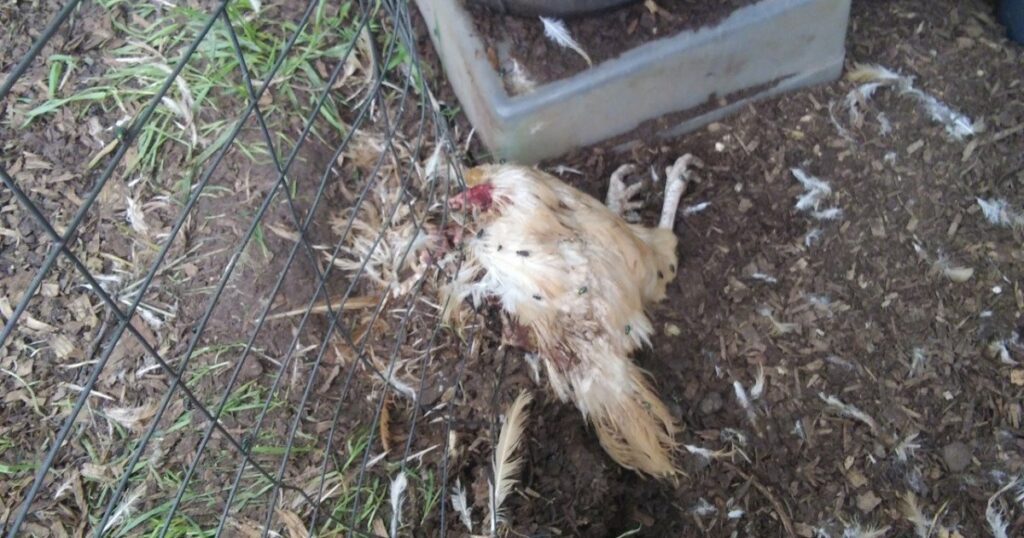
Raccoons are known to be opportunistic predators, and chickens are often an easy target. Predatory incidents involving raccoons and chickens are not uncommon and can occur both during the day and at night. Raccoons are known to attack and kill chickens by biting their heads or necks, and they may also eat the chickens' internal organs.
Raccoons are skilled climbers and they can easily gain access to chicken coops and henhouses. Once inside, they may kill multiple chickens in a single night, causing significant damage to a flock. They may also steal eggs and damage equipment.
Yes, raccoons do eat chickens. Their opportunistic nature compels them to attack and kill chickens if given the chance. However, it's important to note not all raccoons will target chickens, and some may prefer to feed on other food sources such as fruits, vegetables, and small animals.
To prevent raccoon-chicken interactions, it's important to secure chicken coops and henhouses with sturdy fencing and locks. Additionally, it's recommended to keep chickens locked up at night when raccoons are most active. By taking these precautions, chicken owners can help protect their flocks from raccoon predation.
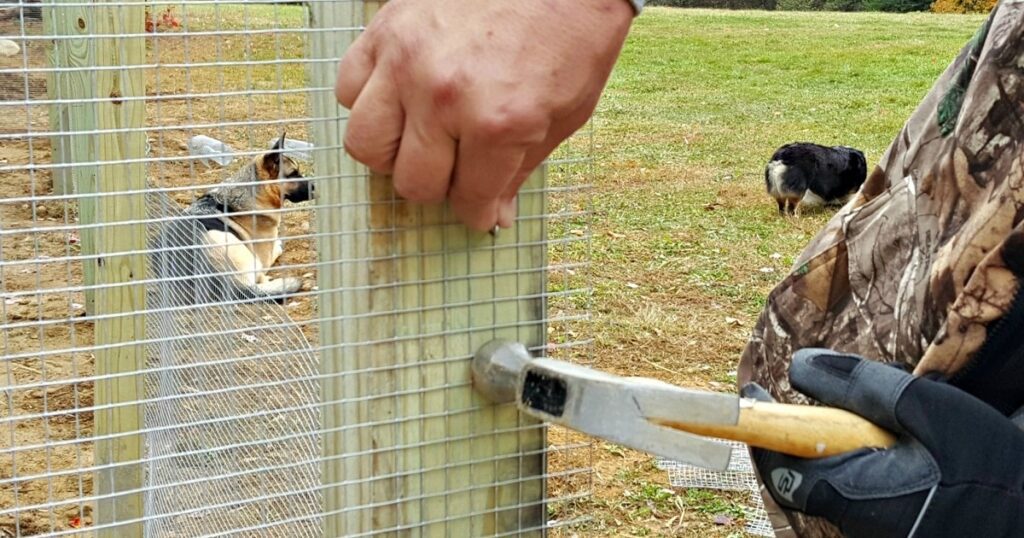
One of the most effective ways to keep chickens safe from raccoons is to fortify their coop. This involves ensuring that the coop is secure and that there are no weak points where raccoons can enter. Sturdy materials like hardware cloth or even welded wire mesh can be used to cover all openings, including windows and vents.
Additionally, it's important to ensure that the coop is elevated off the ground and that there are no gaps or holes in the flooring. This will prevent raccoons from digging underneath the coop and gaining access to the chickens.
In addition to fortifying the coop, several deterrents can be applied to keep raccoons away from chickens. One effective deterrent is motion-activated lights or sprinklers, which can startle raccoons and make them think twice about approaching the coop.
Another option is to use predator urine or other scents that raccoons find unpleasant. These can be sprayed around the perimeter of the coop to create a barrier that raccoons will be reluctant to cross.
Finally, it's important to keep the area around the coop clean of food scraps or other enticing attractants. This will help to discourage raccoons from hanging around the area and looking for ways to get to the chickens.
By taking these protective measures, chicken owners can help to keep their feathered friends safe from raccoons and other predators.
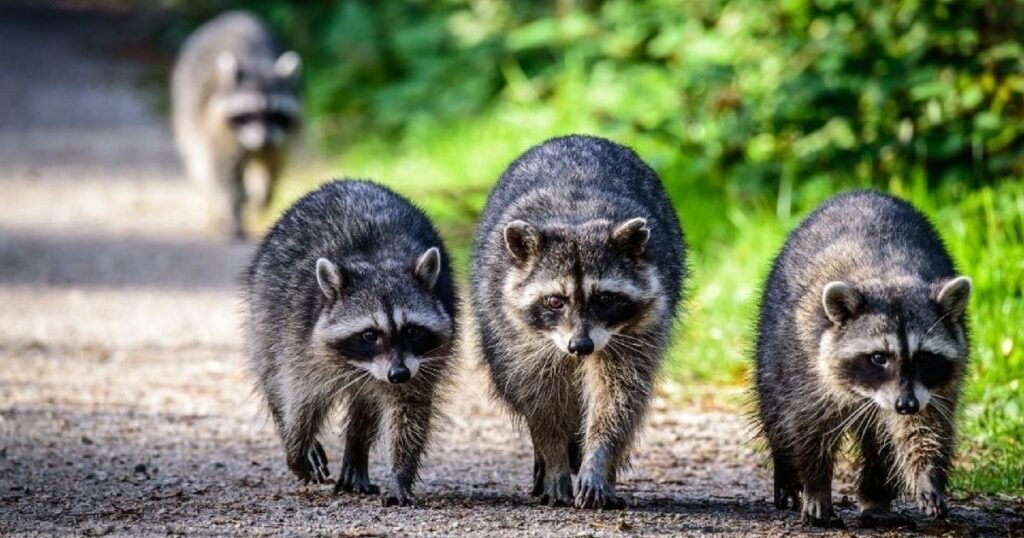
Raccoons are opportunistic predators that feed on various prey, including chickens. Understanding how raccoons kill chickens can help chicken owners protect their flock.
Raccoons are known for their distinctive kill patterns. They will kill more chickens than they can consume, leaving behind a trail of dead birds with missing heads or limbs. If you wonder why do raccoons kill chickens and not eat them, it’s because they hunt not only for food but also for sport.
So, why do raccoons kill chickens during the day? While raccoons are primarily nocturnal animals, they are known to attack chickens in daytime as well. This rings too true if they are hungry or if there is an easy opportunity for them to catch a chicken. Chickens that are outside of their coop during the day are more vulnerable to raccoon attacks.
Chicken owners must take steps to protect their flock from raccoon predation. This can include securing the coop with sturdy locks and wire mesh, keeping chickens inside the coop at night and day, and removing any potential food sources from the area around the coop.
Overall, understanding raccoon predation is key to protecting chickens from these opportunistic predators. By taking steps to secure the coop and keep chickens safe, chicken owners can ensure that their flock is protected from raccoons and other predators.
Raccoons are known to be opportunistic hunters. They will attack chickens when the opportunity arises. They are primarily nocturnal animals and will usually attack at night when the chickens are sleeping. Raccoons are also very intelligent and use multiple tactics to catch their prey.
One of the most common tactics that raccoons use to catch chickens is to climb up onto the roof of the chicken coop and then jump down onto the chickens. They will also dig under the coop to gain access to the chickens. Raccoons use their sharp claws to grab and hold onto their prey.
When raccoons catch a chicken, they will usually kill it by biting its head or neck. They will then consume the chicken, often starting with the head and neck. Raccoons are known to be messy eaters and often leave a mess behind of feathers and other debris.
It's important to note that raccoons do not always eat the chickens they kill. Sometimes, they kill the chickens for sport or as a territorial display. In some cases, raccoons may only eat certain parts of the chicken, such as the liver or heart.
Raccoons are known to attack chickens, which can devastate poultry owners. However, several measures can be taken to prevent raccoon attacks. The following subsections offer several tips on how to keep raccoons away from chickens and how to protect chickens from raccoons.
One of the best ways to prevent raccoon attacks is to ensure chickens are kept in a secure coop at night. Raccoons are nocturnal animals, so they are most active at night, so it's important to ensure the coop is securely locked at night. Additionally, it's important to keep the coop clean and free from food scraps, as this can attract raccoons.
Another effective way to prevent raccoon attacks is to install motion-activated lights and alarms around the coop. This can deter raccoons from approaching the coop and alert the owner if a raccoon is attempting to gain access.
When building a chicken coop, it's important to ensure it's secure and predator-proof, which can be achieved by using sturdy materials. You should also ensure there are no gaps or holes that raccoons can use to gain access. Additionally, it's important to install strong wire mesh around the coop to prevent raccoons from digging under it.
Another important tip is to ensure the coop is elevated off the ground. This can make it more difficult for raccoons to access the coop and can also prevent other predators, such as foxes and coyotes, from gaining access.
In conclusion, preventing raccoon attacks on chickens requires a combination of best practices and safe housing tips. By following these tips, poultry owners can help to protect their chickens from raccoon attacks.
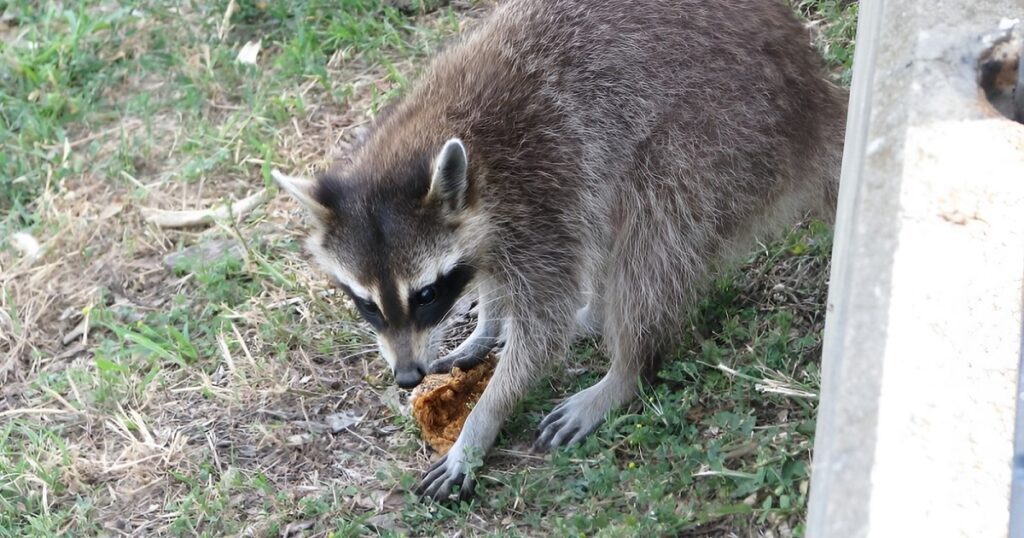
Raccoons are opportunistic by nature, meaning they will eat almost anything that is available to them. Their diet includes fruits, vegetables, insects, small animals, and even garbage. However, when it comes to chickens, raccoons are particularly motivated to hunt and kill them.
One reason why raccoons are drawn to chickens is because they are a good source of protein. Chickens are small enough for raccoons to handle, and they are easy prey because they are often kept in coops or pens that are not fully secure. Additionally, chickens are relatively slow-moving, which makes them an easy target for raccoons.
Another factor that motivates raccoons to hunt chickens is their natural instinct to forage for food. Raccoons will search for food wherever it feels natural to do so. When they come across a chicken coop or pen, they may see it as an opportunity to find a quick and easy meal.
Raccoons are known for their territorial behavior, which means that they defend their territory against other raccoons. This behavior is pronounced during the breeding season when males fight for access to females.
When it comes to chickens, raccoons may see them as a threat to their territory. Chickens are often kept in coops or pens on the raccoon's territory, which can be seen as challenging their dominance. To assert their dominance, raccoons may attack and kill chickens as a way of sending a message to other animals in the area.
When a raccoon attacks a chicken, it typically goes for the head and neck region. They are smart enough to know the head contains vital organs, such as the brain and the eyes, which are easy targets for them. In addition, the neck is the weakest part of the chicken's body, making it easier for the raccoon to grab and bite.
The most common injuries observed in chicken kills by raccoons are decapitation and evisceration. Decapitation occurs when the raccoon bites off the head of the chicken, while evisceration occurs when the raccoon tears open the chicken's abdomen and removes its internal organs.
One interesting phenomenon observed in raccoon attacks on chickens is head predation. This refers to the fact that raccoons often only eat the chicken's head, leaving the rest of the body untouched. There are several reasons why raccoons may exhibit this behavior.
One reason is that the head contains the most nutritious parts of the chicken, such as the brain and eyes. Another reason is that the head is the easiest part of the chicken to eat, as it's small and easy to handle. Finally, raccoons may be attracted to the chicken's blood and brains, as these are highly nutritious and appealing to them.
In conclusion, when a raccoon attacks a chicken, it typically targets the head and neck region, causing decapitation and evisceration. Additionally, raccoons may exhibit head predation behavior, in which they only eat the chicken's head.
In many regions, raccoons are considered a protected species. Therefore, it's illegal to harm or kill them without a permit. In the United States, the Migratory Bird Treaty Act and the Endangered Species Act protect raccoons and their habitats. Additionally, quite a few states have laws regulating wildlife, including raccoons. It's important to check with local wildlife agencies to understand the laws in your area.
When dealing with raccoons that may threaten chickens, it's important to use humane control methods. This means skipping the use of lethal traps or poisons that can harm not only the raccoons but also other animals in the ecosystem. Instead, homeowners can use exclusion methods such as fencing, netting, and hardware cloth to prevent raccoons from accessing the chicken coop.
It's also important to note that raccoons are intelligent and adaptable animals. Therefore, it's important to regularly monitor and maintain any exclusion methods to ensure their effectiveness. If a raccoon does manage to access the chicken coop, it's recommended to use humane live traps to relocate the animal to another habitat, preferably away from residential areas.
Overall, it's important to consider both the legal and ethical implications of controlling raccoons that may be a threat to chickens. By using humane and effective control methods, homeowners can protect their chickens while also respecting the natural environment and wildlife laws.
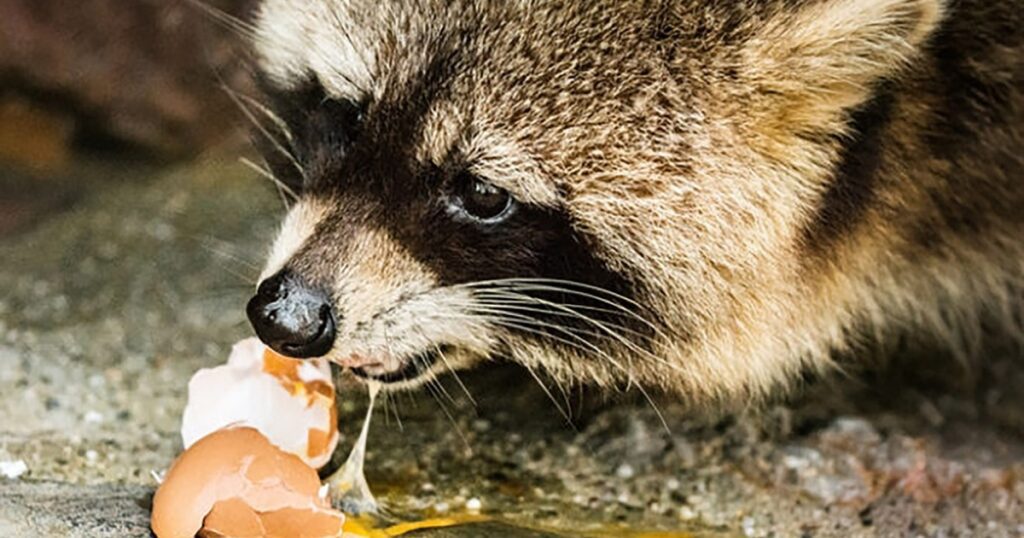
Raccoons are known to attack and kill chickens, causing significant financial losses for poultry farmers. These attacks can occur at any time of the day or night, making it difficult for farmers to protect their flocks. In addition to the loss of chickens, raccoons can damage equipment and infrastructure, further increasing the cost of farming.
To prevent raccoon attacks on poultry farms, farmers can take several measures, including securing chicken coops with strong and sturdy fencing, using motion-activated lights and alarms, and hiring professional wildlife removal companies like Critter Stop to remove raccoons from their property.
Raccoons play an essential role in the ecosystem. These little creatures help control populations of insects and small animals. However, when their population grows too large, they can become a nuisance to humans and damage property.
It is important to manage raccoon populations humanely and responsibly to maintain a healthy ecosystem balance. Critter Stop is a professional wildlife removal company specializing in humane raccoon removal. They use safe and effective methods to remove raccoons from Frisco properties without harming the animals.
Homeowners and farmers should hire the right people for the job when dealing with raccoons on their property. Critter Stop has a fantastic reputation, and customer reviews online, backed up by our commitment to high-quality work and great customer service. We have the expertise and experience to safely and effectively remove raccoons from properties and prevent future infestations.
By hiring professional wildlife experts like Critter Stop, homeowners and farmers can ensure that their properties are protected from raccoon damage and infestations. If you’re struggling with raccoons eating your chickens, call us at (214) 234-2616 for a free consultation.
Yes, raccoons attack chickens and kill them. They are known to be cunning predators that can easily breach chicken coops if they are not properly secured. Raccoons typically attack at night, using their dexterous paws to open latches and access the chickens.
While raccoons are primarily nocturnal, they can attack chickens during the day, especially if they are hungry or if their natural habitat has been disturbed. It is less common, but daytime attacks can happen, particularly in urban areas where raccoons may feel more comfortable moving about during daylight hours.
To protect chickens from raccoons, secure your chicken coop with sturdy, raccoon-proof latches and ensure there are no gaps or weak spots where a raccoon could gain entry. Use hardware cloth instead of chicken wire for enclosures, as raccoons can tear through chicken wire. Additionally, consider installing motion-activated lights or using raccoon deterrents like ammonia-soaked rags to keep raccoons at bay.
If a raccoon has killed your chickens, you may notice feathers scattered around the coop or yard, as well as signs of forced entry into the coop. Raccoons are known to kill multiple chickens in one attack, so if you have multiple missing birds, this may be a sign of a raccoon attack.
To prevent raccoons from attacking your chicken coop, it's important to ensure it's secure. This means using sturdy materials for the coop and run and ensuring all doors and windows are securely locked at night. You can also install motion-activated lights or use noise deterrents to scare off raccoons.
Raccoons are primarily nocturnal animals, so chickens are most at risk of raccoon attacks at night. It's important to ensure your coop is secure and locked up tight before nightfall to prevent raccoons from gaining access.
If you suspect that a raccoon is eating your chickens' eggs, you may notice broken eggshells around the coop or yard. Raccoons are known to raid chicken coops for eggs, so it's important to collect eggs frequently and keep them in a secure location.
Raccoons are active year-round, so chickens are not necessarily safe from raccoon attacks during the winter months. In fact, raccoons may be more likely to attack chickens during the winter when food sources are scarce. It's important to take steps to secure your coop year-round.
To protect chickens from raccoons, the coop must be secure and locked up at night. You can also install motion-activated lights or use noise deterrents to scare off raccoons. Additionally, removing any potential food sources from around the coop, such as garbage or pet food, can help deter raccoons from the area.
Visit our Critter Library and learn more about our furry friends